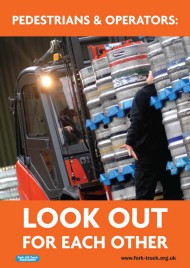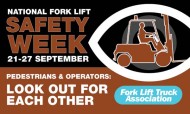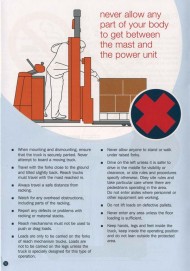 It’s a dull and dreary day. Having just refuelled, a couple of counterbalance trucks are shifting pallets of bricks from the warehouse to a holding area in the yard. There’s a bit of a breeze and it has just started to rain.
It’s a dull and dreary day. Having just refuelled, a couple of counterbalance trucks are shifting pallets of bricks from the warehouse to a holding area in the yard. There’s a bit of a breeze and it has just started to rain.
The trucks have overhead guards, but no cabs. John’s got a bit of a chesty cough and he hates rain, but the weather is set in and this job is going to take at least another hour. So he stops his truck and reaches behind his seat for a sheet of plastic with elastic toggles tied to the corners. “Any fool can get wet and cold,” he thinks to himself, “but I’m no fool.”
He tilts the mast forward and, using his plastic seat as a step, he climbs onto the metal lip above the instrument panel to fix the plastic to the edge of the overhead guard. The truck’s metalwork is already glistening with beads of water and the traces of diesel fuel on the rubber soles of John’s boots offer no grip. His foot slips. Trying to find a good footing, his heel catches the tilt lever.
In a moment of panic that seems to last a lifetime, John tries to pull himself free – fighting for breath as the mast crushes him against the front of the rollover cage. Slowly, the light goes out of his world…
A figment of some writer’s gory imagination? Not at all.
 At least one UK worker is killed in this horrible fashion every year and many more lose limbs or suffer other terrible injuries. John was a fool, but he’s one of many.
At least one UK worker is killed in this horrible fashion every year and many more lose limbs or suffer other terrible injuries. John was a fool, but he’s one of many.
Of course, John should have known better… But training and awareness is not just the operator’s responsibility. John had done this before. After all, he had the plastic ready with him behind his seat. Had his supervisors or managers never noticed him driving with his makeshift cab before?
Importantly, could this happen in your yard or warehouse? Or have other elements of bad practice crept in? Think about it.
The FLTA produces Operator Safety Booklets for Counterbalance Trucks and Warehouse Lifting Equipment, which can be ordered online from the FLTA website: www.fork-truck.org.uk.
These booklets contain a section filled with advice for operators and another aimed specifically at employers. To recognise and – more importantly – deal with bad practice in a timely, confident and appropriate way, we strongly recommend that supervisors and local managers become familiar with both sections.
Look out for each other
Every day in the UK, at least one worker is hospitalised with serious injuries or killed following an accident involving a fork lift truck. National Fork Lift Safety Week was launched in 2008 to raise awareness of dangers of working near fork lift trucks, and the importance of common sense measures that can make fork lift operations as safe and efficient as possible.
 Many workers simply don’t realise that you don’t have to be operating a fork lift truck to be injured by one, or even killed: two-thirds of those hospitalised in fork lift accidents are pedestrians.
Many workers simply don’t realise that you don’t have to be operating a fork lift truck to be injured by one, or even killed: two-thirds of those hospitalised in fork lift accidents are pedestrians.
Accordingly, the message behind this year’s National Fork Lift Safety Week is for truck operators and pedestrians alike: Look out for each other.
This is aimed firstly at fork lift truck operators, reminding them to:
• Be aware
• Be vigilant
• Protect your colleagues
Secondly, it is directed towards pedestrians wherever there are fork lift trucks working, warning them to:
• Keep your eyes open
• Never assume you have been seen
• Always exercise caution
Serious fork lift truck accidents impact physically, mentally and emotionally on every person involved… By taking extra care and making allowances for your colleagues, you can protect yourself and others.
To find out more about Safety Week or the Fork Lift Truck Association, please visit the FLTA website, www.fork-truck.org.uk, today.




Comments are closed.